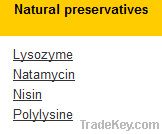الوصف
Natamycin is a naturally occurring antifungal agent produced
during fermentation by the bacterium Streptomyces
natalensisl. Natamycin is effective at very low levels as
fungicide and it is used in the food industry as a "natural"
preservative.
Natamycin is used in the US as a food preservative in dairy
products, such as cheeses and in the EU it is approved as a
surface preservative for certain cheese and dried sausage
products.
Natamycin has a very low solubility in water; however we supply
improved water-soluble natamycin along with usual non-soluble
natamycin.
Recommended usage:
1. Dry cheese can be dipped into or sprayed with water-solution
of natamycin with the concentration of **0~**0mg/kg (FDA,
§**2.**5, ***6).
2. Processed meat (including ham and bacon) and unheated
dried meat, poultry - 6mg/kg; ground processed meat and dried meat,
poultry - *0mg/kg (JECFA, ***5).
Polylysine (ε-poly-L-lysine, EPL) is produced during fermentation
by the bacterium Strepomyces albulus. It has an
antimicrobial effect against yeast, fungi, Gram-positive bacteria
and Gram-negative bacteria (such as Escherichia coli and
Salmonella).
Polylysine was approved as a food preservative in Japan, Korea
and the United States. The characteristics of polylysine as a
food preservative include:
1. It is a broad-spectrum antibiotic;
2. It is very safe for human consumption because after
consumption polylysine is broken down into lysine that is an
essential amino acid for human. Therefore it is non-toxic and was
recognized as a nutritional preservative by FDA in ***3;
3. It has execellent thermal stability, e.g. it remains bioactive
after being heated in *0ËšC for *0 minutes or in **0ËšC for *0
minutes;
4. It is effective in a wide range of pH values ranging from 3 to
9;
5. It is water soluble.
Usual application in food: cooked rice, cakes, pastries,
condiments, soft drinks, dairy products, sea food, meat products
and canned food.
Lysozyme is extracted from egg white. The enzyme functions by
attacking peptidoglycans (found in the cell walls of bacteria,
especially Gram-positive bacteria).
Usual application in food: sanitary products,
pharmaceuticals, wine, meat products and sea food.
Nisin is produced by fermentation using the bacterium
Lactococcus lactis. Nisin is a polycyclic antibacterial
peptide with *4 amino acid residues used as a food preservative.
Nisin is a broad-spectrum bacteriocin effective against many
Gram-positive organisms, including lactic acid bacteria (commonly
associated with spoilage), Listeria monocytogenes,
Staphylococcus aureus, Bacillus cereus,
Clostridium botulinum, etc. It is also particularly
effective against spores. Nisin is soluble in water and effective
at extremely low levels.
It is used in processed cheese, meat products, beverages,
etc. during production to extend shelf life by suppressing
Gram-positive spoilage and pathogenic bacteria. In foods, it is
common to use Nisin at levels ranging from 1 to *5ppm, depending on
the food type and regulatory approval.
| بلد: |
China |
| نموذج رقم: |
02
|
| سعر فوب: |
(قابل للتفاوض)
أحصل على آخر سعر
|
| الموقع: |
- |
| سعر الحد الأدنى للطلب: |
- |
| الحد الأدني للطلب: |
1 Kilogram |
| تفاصيل التغليف: |
- |
| موعد التسليم: |
- |
| القدرة على التوريد: |
- |
| نوع الدفع: |
L/C, T/T |
| مجموعة المنتج : |
- |

